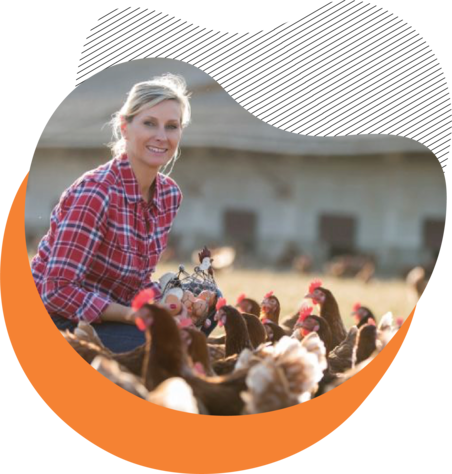ANIMAL WELFARE FOR
FARMERS
HOW CAN WE HELP?
By :
Natalie Stewart, Co-Founder JAAN

Berbagai perusahaan internasional telah berkomitmen untuk berubah secara bertahap dengan menjadikan
pemasok telur bebas kandang dalam rantai pasok mereka. Lihat siapa saja yang telah menyatakan perubahan
dan periksa kebijakan mereka di bawah ini.


HOW TO INVEST
IN FREE RANGE FARMS
Farm Animal Care Alliance recommended all factories to adopt farming system that is already “Humane Certified” and is already available in Southeast Asia.
There are many things that we need to ensure in free range system, to make sure that we meet all sufficient welfare indicators below:
- Maximum capacity
- The amounts of nests and perching spaces
- Enough space for poop or space for sleep
- The practice of beak trimming, not debeaking
- Good condition for pullet nest
- Enough waterers
- Lighting periods (approximately 14 hours a day)
- Ventilation
- Not using animal byproducts for animal food
- Not using growth hormones for animals
- Antibiotics and coccidiostats only used for therapeutic purposes.
By acknowledging these standards from the beginning, your farm will be ready for animal animal welfare certification and considered as a reliable supplier for big businesses that already adopted free range egg policy.
ADDITIONAL BENEFIT: INCREASE LEVEL ON
FOOD SAFETY
Eggs often contaminated by salmonella, a bacteria which makes thousands of people got sick every year, even causing death, especially to children worldwide.
European Food Safety Authority did an extensive research by comparing salmonella in battery cages system to cage free system.
This analysis found 43% lower chance of Salmonella Enteritidis contamination in cage free system, where
chickens grow in closed barn istead of battery cages. In organic eggs production, there is a 95% lower chance of Salmonella Enteritidis contamination. In free range system, the chance is 98% lower.
For Salmonella Typhimurium, there is a 77% lower chance of salmonella contamination in free cage system compared to in battery cage system and 93% lower chance in organic system and free range system.
For other Salmonella stereotypes, compared to systems where chickens have to live in cages , there is a 96% lower chance in barn system, ebih rendah dalam sistem lumbung, 98% lower chance in organic farming, and 99% lower chance in free range poultry.
That means there is at least 25 times higher chance for contamination in fams that limited its chicken in battery cages compared to free cage systems. European Food Safety Authority analysis concluded that: “Keeping poultry in battery cages has more chance to be contaminated with salmonella.”
Another important topic is the antibiotic intake. In intensive caging system, also known as factory farming, it is very common that animals will be given antibiotics constantly, even when they are not sick. Now there are evidences that this irresponsible practices is increasing absorption to spread super bacteria that is resistant to antibiotics..
The World Health Organization already issued a warning that when the irresponsible use for antibioticcs on animals and human is allowed, then we could experience a post-antibiotic period when curable diseases can caused death.
LOWER ENVIRONMENTAL IMPACT
In the farms that use natural system – such as free range and organics – the animals are often fed with plant based food, On the other hand, factory farming use animal food – such as fishmeal.
Researches showed that we can reduce negative impact on our environment from layer chicken farming, for instance, using only vegetarian food.
The scientists at University of British Columbia has concluded that when layer chickens only consume organics and vegetarian food, this can reduce CO2 more than 50%..The use of fishmeal as animal food has raised some attention.
According to the UN, around 15 million tons fish were caught every year to produce fishmeal and mostly used in chicken farms.
UN also stated that more than 70% of world fisheries are from over exploitation.
Some species of fish that were caught has extinct commercially, and more are nearly extinct.
Our marine environment and threats from climate change are issues that cannot be ignored. This is the time to be comcern and support environment friendly farms that only use vegetarian food.